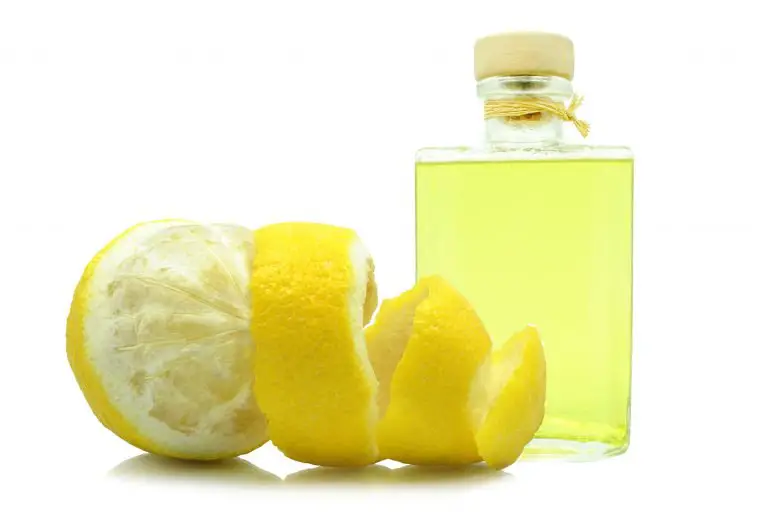
Page Contents
Lemon peel oil is one of the less common oils that you may have heard about as being good for hair. That said, this oil has a bit of debate going on as to whether or not you should even put it on your hair at all. Still, even a little help with your hair growth is still nice, and lemon peel oil is worth looking at.
What Is Lemon Peel Oil?
Lemon peel oil actually has a lot in common with lemon oil, but these are two completely different things. While the inside of the lemon is what we usually eat, the peel is something that we often find as zest and things like that.
Nutritionally speaking, lemon peel is actually better for you in many ways than lemon juice is. For example, most of the Vitamin C that is found in lemons is actually in the peel. And the same goes for several of the other vitamins and minerals in lemons.
In fact, in a way, the lemon peel is more potent because it is not watered down with the juice. This means that the lemon peel oil is quite possibly better. Though the oils of these two parts might be more similar than the actual peel and juice are, the oil is easier to get out of the peel. This means that less processing is required for lemon peel oil.
More than that, the citric parts of the lemon juice aren’t as prevalent in the peel. These are the parts that wear away at the enamel of your teeth when you drink too much lemonade. The absence of this in the lemon peel oil is yet another reason why it is better.
As to how lemon peel oil is made, this is most often done in a press of some kind. What little juices there are, get squeezed out of the peels. This juice is then separated out into the oil and a little of a nondescript juice.
The Benefits Of Lemon Peel Oil
Lemon peel oil has numerous benefits to offer you. First of all, this oil, like lemon oil, can help you to regulate your ph. This helps with many different skin problems. Along with that, this oil is also extremely exfoliating for your skin.
Exfoliating your skin means that dead skin cells are removed, and blood flow is increased to your living cells. This keeps them healthy, and healthy skin is good for your immune system and a lot of other things. Lemon peel oil is also an astringent, which helps it clean out even more deeply into your cells.
While the lemon peel oil is in your skin, it will also leave the nutrients behind as it nourishes your skin. D-limonene is found only in the peel of lemons, which is an antioxidant. Antioxidants are wonderful for your health, especially your immune system. D-limonene also helps reduce oxidative stress, which is what makes your skin look old with wrinkles and age spots.
Some other things include phosphor, Vitamin B, and bioactive compounds, which provide all sorts of health benefits as well. There are also smaller amounts of calcium, magnesium, potassium, and several other minor minerals.
Lemon peel oil has a lot of antibacterial substances. In fact, there are four different compounds in this that have antibacterial properties that can fight against any bad bacteria.
The pectin, also only found in the peel, can even help reduce your cholesterol levels. This keeps your heart and your arteries healthy, which is a great concern for most people nowadays.
Lemon peel not only has antimicrobial and antifungal properties, but it also has astringent, antiseptic, rubefacient, and diuretic properties. These bring balance to the fluids that are in your cells, also helping with circulation.
For Your Hair
When it comes to how lemon peel oil affects your hair, there are a lot of ways. For starters, the nutrient density of this oil means that it is very nourishing for your hair. The Vitamin C and the D-limonene, in particular, are perfect for encouraging hair health and growth.
The help with ph balance is also much appreciated by your scalp, since imbalances here can lead to fungal infections and other problems. The antibacterial properties of the peel work toward this same goal, keeping your scalp as healthy as possible.
Then the antioxidant, D-limonene, is one of the best sorts. Like all of the other antioxidants, it fights the free radicals that can damage the roots of your hair. The D-limonene assisting with oxidative stress may help your skin, but it also helps postpone graying.
Lemon peel oil being an astringent allows it to eliminate excess fats on your hair. Along with that, this oil also helps with dandruff, thanks to its exfoliating properties. Meanwhile, the astringent parts of it sort of act like a detox for your hair.
All in all, lemon peel oil can stimulate hair growth. Though it has no DHT-blocking abilities, it helps with so many other things ranging from hormonal changes to deficiencies. Lemon peel oil can even help bring down inflammation slightly, which is something that often goes hand in hand with hair loss.
Cautions When Using Lemon Peel Oil
Any part of lemon, including the oil from the peel, can react to sunlight. This can bleach your hair, in a way burning it with the sunlight. Obviously, with the word ‘burning,’ this is very damaging for your hair and something that you should avoid.
While steam-distilled lemon peel oil does not contain the plant substance that causes photosensitivity, it can still be present in small amounts. In severe cases, this photosensitivity can cause blisters, redness, itching, and other things.
On this topic, changes in hair color are fairly common when you use lemon peel oil. True, this is mostly if you overuse the oil and rarely happens with just a few drops. However, this color change is still a concern, especially if you dye your hair.
Though equally rare, lemon peel oil can also react to other hair products. Products that have baking soda or other similar ingredients should be avoided when you have any trace of this oil in your hair. The acidity in the lemon reacts with these ingredients with unexpected results.
Lemon peel oil is also not something you want to leave in your hair for very long. It is still an oil that can irritate your skin, after all. In short, lemon peel oil may be great for your hair, but it should still be used with caution.
Related Reading
How To Use Lemon Peel Oil
Should you decide that using lemon peel oil is something you want to do to try to help grow your hair, there are a few ways that you can do this. The simplest, of course, is to get a shampoo and/or conditioner that has this oil as one of its ingredients.
However, you may prefer just to add a few drops of lemon peel oil to your current shampoo and conditioner. This way, changing your hair routine won’t be necessary, especially if your shampoo is already for treating hair loss.
Using the lemon peel oil in your hair products is actually particularly good. Shampoos have the tendency to be acidic. Though lemon peel might seem to be acidic as well, it actually will make your shampoo more alkaline. In this case, leaving your hair products in your hair longer is something that you should at least consider.
Other ways to use lemon peel oil is by inhalation, either by putting a few drops on your hands and covering your nose or by using a diffuser.
Though not nearly as effective, the lemon peel can be added to foods. You can put lemon peel o top of salads, in your yogurt, in your soups, drinks, dressings, and marinades, and even in your tea. You can also buy lemon peel in powdered or candied form, though this is obviously not going to be as healthy or beneficial.
Finally, if you can’t get lemon oil, and you don’t think that consuming it will help your hair, you may be able to make your own. Making this oil yourself will take time and effort, but all you need are fresh lemons and a few tools. You even get to have some lemon juice as a by-product of making this oil.
Final Thoughts
As you can see, lemon peel is great for so much more than simply being used in pies and desserts. It is also ideal for helping with your hair and other aspects of your health. Lemons are used for all kinds of things ranging from lemon fruit extract to lemon fruit powder, and there is even such a thing as lemon peel wax.
These lemon ingredients are found in everything from candles and fragrances to bath products and makeup. Lemon peel oil might be slightly comparable to the oil made from other citrus peels in that they are all found in various products. However, lemon peel surprisingly has even stronger antioxidant activity than grapefruit or tangerine peels.
The question of it being a truth or a myth as to if lemon peel oil can help you is a complicated one. Simply put, the reason for the debate is the fact that this oil may or may not work for you. If you happen to like lemons, however, your hair might too.

![50 Insane Facts About Hair [Infographic] Beautiful](https://hairlossgeeks.com/wp-content/uploads/2019/07/beautiful-2405131_1280-1.jpg)





